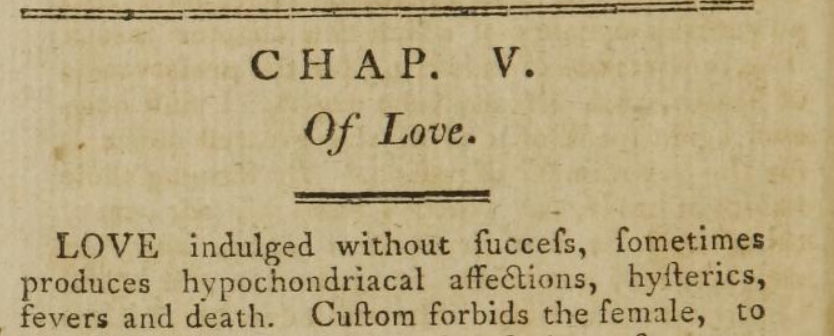I get a kick out of reading old books on archive.org and Google Books. Today I’d like to share an excerpt of valuable advice from The married lady’s companion : or, Poor man’s friend; in four parts : I. An address to the married lady, who is the mother of daughters : II. An address to the newly married lady : III. Some important hints to the midwife : IV. An essay on the management and common diseases of children, an 1808 title by Samuel K Jennings. After all, as this book tells us, “A few lessons seasonably given may prevent much mischief.”
Let’s start with some advice from Chapter 5, Of Love. The excessive commas are original.
Love indulged without success, sometimes produces hypochondriacal affections, hysterics, fevers and death. Custom forbids the female, to make suit to the male, whether such a custom may not be founded in error, is not my business at present to enquire. It is now so firmly established, that the ladies are under the necessity of accommodating themselves to it.
Translation
Unrequited love is the worst. Ladies, you can’t pursue a man you fall in love with—which sounds stupid, I know—but that’s the way it is. Anyway, it’s best not to fall in love until the man is in love with you first.
Jennings follows this with the habits which ought to be avoided, as they might lead a young lady to the possibility of falling in love.
First, idleness. If your daughter has time for flights of fancy, this may lead to “the formation of designs which in their issue bring disquiet and bitterness to the remainder of life.” Therefore, keep her too busy to grow “constantly perplexed, with all the imaginations, which are attendant, on an insatiate wish for a husband.” If she does inappropriately fall in love, take her for “a long journey through some pleasant country” to help her forget him.
The second thing to avoid, in order not to fall in senselessly in love, is reading novels and romances. (Surprise! …not.)
The unwarrantable amours and intrigues, which fill up most works of this kind, cannot fail to raise propensities the most unfriendly to virtuous continence. ‘Evil communication corrupts good manners.’ And to indulge the imagination in contemplating such amours cannot differ, but in degree, from associating with the hero or heroine of the play. Besides, the examples of human excellence, as displayed in most of their fine characters, do no where exist in real life; of course the unfortunate girl, who has formed an opinion of her lover, from one of those highly coloured pictures, is at length disappointed, disgusted and miserable.
Better sentiments may be collected from other books, and you will be wise, to commit your novels to the flames, rather than to the hands of your daughter.
This is advice from 1808. The ‘those trashy books will give you an unrealistic worldview’ argument has been around for a long time. 1808, by the way, is a full two centuries after Don Quixote goes delightfully mad after spending too much time reading novels full of “highly coloured pictures.” Has anyone written a female Don Quixote? Of course someone has: Charlotte Lennox in 1752 published The Female Quixote, but I’m sure there are others exploring the same theme. Another rabbit-hole to explore someday…




“Has anyone written a female Don Quixote?”
Would Madame Bovary count?
I’m afraid I haven’t read Madame Bovary, but just from a plot summary it appears that she is conscious/cognizant of deliberately rejecting everyday life, while Don Quixote is about losing touch with reality and slipping into fantasy. My memory of DQ is that it is presented as a weakness of his (elderly) mind that he is prey to fantastic ideas, while MB sounds more like strength of will to reject/reshape her reality?